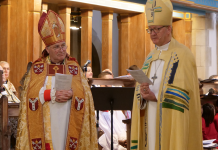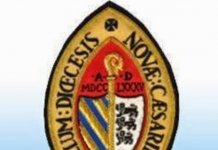A group of 22 theologians from seminaries within and beyond The Episcopal Church have written a statement expressing concern about what they say is a misunderstanding of sacramental significance expressed in the arguments for opening the Eucharist to all who wish to receive it. Currently, The Episcopal Church’s canons restrict the Eucharist to people who have been baptized. A General Convention resolution to repeal that canon has been proposed by the Diocese of Northern California.
The theologians’ statement does not mention proposed Resolution C028 but asserts that the link between the sacraments of Holy Baptism and the Holy Eucharist is central to The Episcopal Church’s historical understanding of sacramental theology and that it should not be portrayed as “exclusive or inhospitable.”
An attached cover letter dated May 31, however, does mention C028. The letter and statement were sent to the chairs of the House of Bishops’ and House of Deputies’ Committees on Constitution and Canons and Prayer Book, Liturgy and Music, “asking that you share this statement with your constitutive members for their consideration.”
May 31, 2022
Dear Bishop Klusmeyer, Bishop Lee, Dr. Meyers, and Canon Simmonds Ballentine,
Greetings on this Feast of the Visitation of the Blessed Virgin Mary. I hope this finds all of you safe and well.
On behalf of the 22 scholars who endorse the attached consensus statement, I am writing to you in your respective capacities as the Chairs of the House of Bishops or House of Deputies Committees on Constitution and Canons or Prayer Book, Liturgy and Music, asking that you share this statement with your constitutive members for their consideration. Please note that this statement, which we are also making public, comes only from its signatories in their personal capacity as scholars serving The Episcopal Church in various ways, and not as representatives of our respective institutions.
While the precipitating cause of the statement is the proposed resolution C028 for General Convention to eliminate Canon I.17.7, our concern is broader than that. The statement speaks for itself, but it arises from the more pervasive sense that something has gone amiss in our collective sacramental theology when (1) Baptism is regarded by many as a barrier to participation in the Church; (2) the essential relationship between Baptism and Eucharist is ignored or forgotten; and (3) the Eucharist is regarded exclusively as a “meal” on a “table” and not also a “sacrifice” on an “altar.” Regardless of the fate of Canon I.17.7 either this summer or later, The Episcopal Church must reaffirm its commitment to Baptism as the foundational sacrament through which we become members of the Body of Christ and share in the life of grace; to the Eucharist as the repeatable element of the baptismal rite of initiation; and to an understanding of the Eucharist that holds together the equally necessary emphases of meal/table and sacrifice/altar. To let go of any of these three commitments is to relinquish our distinctively Anglican sacramental theology and baptismal ecclesiology as articulated in The Book of Common Prayer, many internal statements, and ecumenical dialogues.
Respectfully submitted on behalf of the signatories,
The Rev. Dr. Robert MacSwain
Associate Professor of Theology
The School of Theology
The University of the South Sewanee, TN 37383-0001
A Statement on Baptism and Eucharist in The Episcopal Church
Holy Baptism is the sacramental foundation of our common life with God and one another.
Freely offered to all humanity, Baptism is the fountain from which the other sacraments flow,
that which joins us to Christ and enables us to share in the divine life of the Holy and Blessed
Trinity. This condition is not a natural human birthright but a gift of supernatural grace. Holy
Baptism is what makes the Church the Church and therefore what enables us to participate in all
other Christian sacraments or sacramental rites, such as the Eucharist.
According to The Book of Common Prayer (1979), the Eucharist is not only a holy “meal”
served from a “table,” it is also a sacramental “sacrifice” offered on an “altar.” These
descriptions are not opposed but complementary, and both emphases must be maintained. More
specifically, according to our “Commentary on Eucharistic Sharing,” approved by General
Convention and found in The Episcopal Church’s Handbook for Ecumenism, “The Holy Communion is a sacramental event in the life of God’s people. It is a special offering of
thanksgiving by those who are united by a common faith, responsive to the Word proclaimed in
their midst and recalling in Eucharistic Liturgy the sacrifice of Jesus Christ, their common Lord.
It is a sacrament of unity for God’s people, as it is the divine presence of the one and undivided
Lord, and serves to bind into a common body those whose differences He has reconciled.”
Unlike Baptism, Holy Eucharist is therefore not intended for “all people” without exception, but
is rather for “God’s people” understood above as a common body united by a common faith. To
require such corporate faith as confessed in the Baptismal Covenant is not exclusive or
inhospitable but simply what it means to receive Communion in this Church. Indeed, according
to our “Commentary on Eucharistic Sharing,” in addition to being baptized, those who receive
the Eucharist in The Episcopal Church must “examine their lives, repent of their sins, and be in
love and charity with all people” and “shall approach the Holy Communion as an expression of
the Real Presence of Jesus Christ whose sacrifice once upon the cross was sufficient for all
humankind.” There are thus specific moral and theological commitments both expected in and
expressed by the act of reception. Finally, in liturgical terms, the Eucharist is understood to be
the repeatable culmination of the baptismal rite of initiation, in which those who receive the
elements publicly reaffirm their baptism, as the post-communion prayers clearly indicate.
These are the basic sacramental convictions of The Episcopal Church, and however the canons
express them they need to be acknowledged as such.
Signed
The Rt. Rev. Dr. J. Neil Alexander (Dean Emeritus, Professor of Liturgy Emeritus, and Quintard Professor of Theology Emeritus, The School of Theology, University of the South)
Dr. Anthony D. Baker (Clinton S. Quin Professor of Systematic Theology, Seminary of the Southwest)
The Rev. Dr. Hilary Bogert-Winkler (Assistant Professor of Liturgy, The School of Theology, University of the South)
Dr. Ellen Charry (Margaret W. Harmon Emerita Professor of Systematic Theology, Princeton Theological Seminary)
The Rev. Dr. James Farwell (Professor of Theology and Liturgy, Virginia Theological Seminary)
The Rev. Dr. Jason Fout (Academic Dean and Associate Professor of Anglican Theology, Bexley Seabury)
The Rev. Dr. Julia Gatta (Bishop Frank A. Juhan Professor of Pastoral Theology, The School of Theology, University of the South)
The Rev. Dr. A. Katherine Grieb (Director of the Center for Anglican Communion Studies and Distinguished Professor of New Testament Emerita, Virginia Theological Seminary)
The Rev. Dr. Nathan Jennings (J. Milton Richardson Professor of Liturgics and Anglican Studies and Director of Community Worship, Seminary of the Southwest)
The Rev. Dr. Daniel Joslyn-Siemiatkoski (Duncalf-Villavaso Professor of Church History and Dean of Community Life, Seminary of the Southwest)
The Rev. Dr. Benjamin King (Professor of Christian History and Associate Dean for Academic Affairs, The School of Theology, University of the South)
The Rev. Canon Dr. Lizette Larson-Miller (Huron University College, former Nancy and Michael Kaehr Professor of Liturgical Leadership and Dean of Chapel at the Church Divinity School of the Pacific)
Dr. Scott MacDougall (Associate Professor of Theology, Church Divinity School of the Pacific)
The Rev. Dr. Robert MacSwain O.G.S. (Associate Professor of Theology, The School of Theology, University of the South)
The Very Rev. Dr. Ian Markham (Dean and President, Virginia Theological Seminary)
The Rev. Canon Dr. Kevin Moroney (H. Boone Porter Chair of Liturgics, General Theological Seminary)
The Rev. Dr. Juan M. C. Oliver, Custodian of the Book of Common Prayer and Visiting Professor, The School of Theology, University of the South)
The Rev. Dr. Matthew S. C. Olver (Assistant Professor of Liturgics and Pastoral Theology, Assistant Director of Chapel Liturgy, Nashotah House Theological Seminary)
The Rev. Dr. Katherine Sonderegger (Distinguished Professor of Systematic Theology, Virginia Theological Seminary)
The Rev. Dr. Bryan Spinks (Bishop F. Percy Goddard Professor of Liturgical Studies and Pastoral Theology, Yale University Institute of Sacred Music, Yale Divinity School, and Berkeley Divinity School at Yale)
The Rev. Dr. Shawn Strout (Associate Dean of Chapel and Assistant Professor of Worship, Virginia Theological Seminary)
The Very Rev. Dr. James Turrell (Dean, Norman and Olan Mills Professor of Divinity, and Professor of Liturgy, The School of Theology, University of the South)










